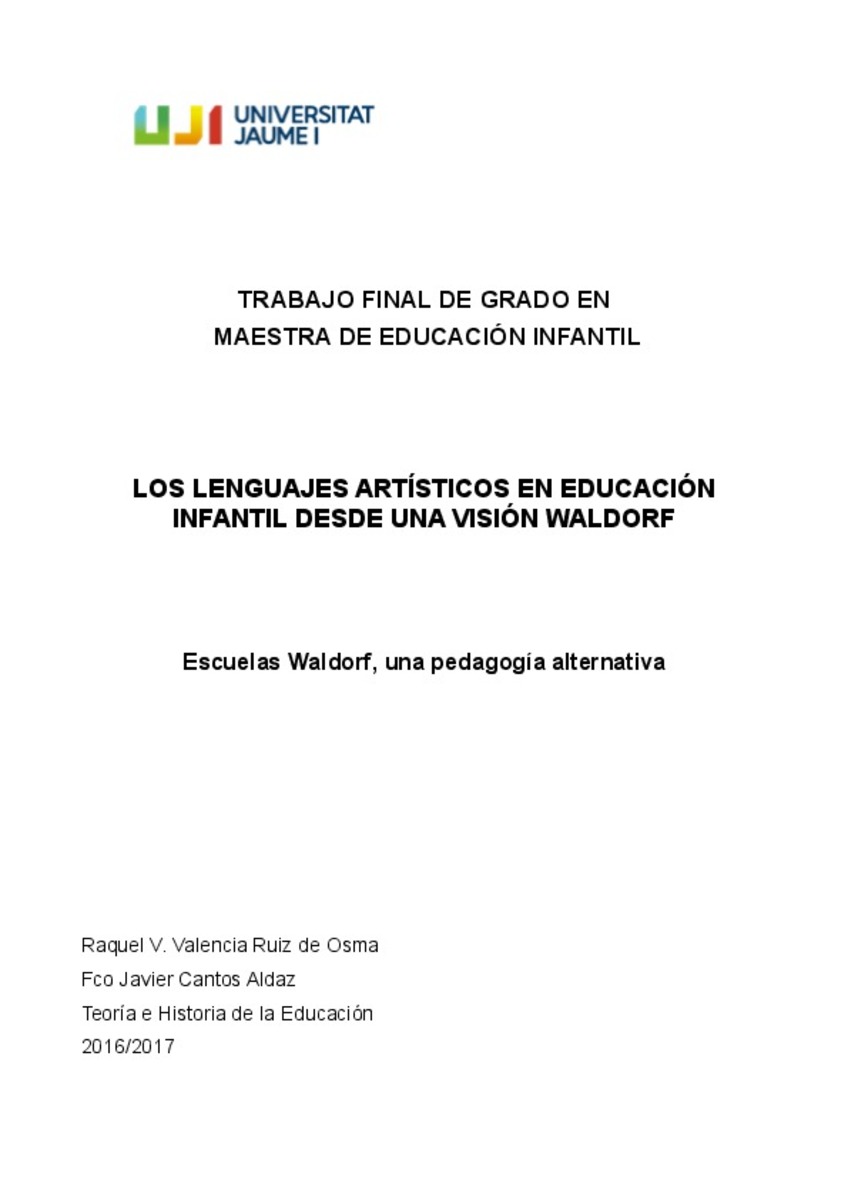Mostrar el registro sencillo del ítem
Los lenguajes artísticos en educación infantil desde una visión Waldorf. Escuelas Waldorf, una pedagogía alternativa
| dc.contributor.author | Valencia Ruiz de Osma, Raquel Vanessa | |
| dc.contributor.author | Universitat Jaume I. Departament d'Educació | |
| dc.contributor.other | Cantos Aldaz, Francisco Javier | |
| dc.date.accessioned | 2017-09-18T18:36:35Z | |
| dc.date.available | 2017-09-18T18:36:35Z | |
| dc.date.issued | 2017-06-14 | |
| dc.identifier.uri | http://hdl.handle.net/10234/168838 | |
| dc.description | Treball final de Grau en Mestre o Mestra d'Educació Infantil. Codi: MI1040. Curs acadèmic 2016-2017 | |
| dc.description.abstract | El autor defiende la idea que los seres humanos estamos conectados con la naturaleza en cuerpo-alma-mente, en el sentido que a través de ella, experimentamos emociones y sensaciones. Steiner, vela por que durante la trayectoria educativa, los discentes trabajen los lenguajes artísticos de manera transversal en el primer septenio. En el sentido que solo deban de preocuparse por jugar, y el papel de los docentes será cerciorarse que los niños estén continuamente renovándose y no pierdan nunca la ganas de “hacer”, porque así es como se involucran y aprenden. A través de la música, la danza, la pintura y las manualidades, los niños desarrollan el máximo sus cualidades y son capaces de desenvolverse con naturalidad en el entorno resolviendo problemas que se les puedan plantear a lo largo de la vida. No obstante, para alcanza esto, será fundamental que la pedagogía se base en el principio del amor, y deben de ser los propios niños los que tengan la iniciativa y necesidad de volver al colegio, entendiéndose así que lo hacen con voluntad. | ca_CA |
| dc.description.abstract | This finally work seeks to work the artistic languages in the stage of early childhood education of Waldorf Rudolf Steiner’s pedagogy, founder of anthroposophy and eurhythmy. With the aim of bringing readers to this movement and turning them into new knowledgers of non-formal education. The author defends the idea that human are connected with nature in body-soul-mind, in the sense that through it, we experience emotions and sensations. Steiner, ensures that during the educational trajectory, the students work the artistic languages transversally in the first septenio. With the objective that they have a good time playing, and teachers only have to ensure that children are continuously renewing and never lose the desire to "do", because in this way, they get involved and learn. The true is that, through music, dance, painting and crafts, children develop their qualities and are able to develop naturally in the environment solving problems that can appear throughout their life. However, to achieve this, it will be fundamental that pedagogy be based on the principle of love, and it should be necesasry that childs have the initiative and need to return to school, meaning that they do so with will. | ca_CA |
| dc.format.extent | 25 p. | ca_CA |
| dc.format.mimetype | application/pdf | ca_CA |
| dc.language.iso | spa | ca_CA |
| dc.publisher | Universitat Jaume I | ca_CA |
| dc.rights | Atribución-NoComercial-CompartirIgual 4.0 Internacional | * |
| dc.rights.uri | http://creativecommons.org/licenses/by-nc-sa/4.0/ | * |
| dc.subject | Grau en Mestre o Mestra d'Educació Infantil | ca_CA |
| dc.subject | Grado en Maestro o Maestra de Educación Infantil | ca_CA |
| dc.subject | Bachelor's Degree in Preschool Education | ca_CA |
| dc.subject | Waldorf | ca_CA |
| dc.subject | Rudolf Steiner | ca_CA |
| dc.subject | antroposofía | ca_CA |
| dc.subject | euritmia | ca_CA |
| dc.subject | lenguajes artísticos | ca_CA |
| dc.subject | educación infantil | ca_CA |
| dc.title | Los lenguajes artísticos en educación infantil desde una visión Waldorf. Escuelas Waldorf, una pedagogía alternativa | ca_CA |
| dc.type | info:eu-repo/semantics/bachelorThesis | ca_CA |
| dc.educationLevel | Estudios de Grado | ca_CA |
| dc.rights.accessRights | info:eu-repo/semantics/openAccess | ca_CA |
Ficheros en el ítem
Este ítem aparece en la(s) siguiente(s) colección(ones)
-
Grau en Mestre o Mestra d'Educació Infantil [1149]
MI1040; MI1840








